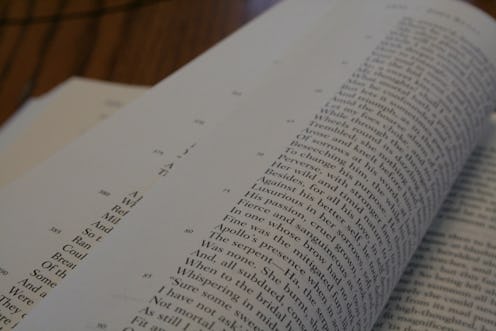Books
7 Books All English Majors Dread Reading

One of my favorite professors in college told me that at an annual English professor conference (it had a fancier title, I'm sure), she and a group of new friends played a game during some downtime; over drinks, they all had to go around and say one book that they’d taught but never actually read. I was simultaneously delighted and horrified by this tidbit — profs! They’re just like us!
Yes, they're just like us — because I, too, had a number of books that I was required to read as an English major that I either hated or mostly skimmed. (That game, by the way, ended with a professor drunkenly admitting to her department chair that she’d never read Hamlet… even though she was teaching a class on Hamlet). Ouch.
Some of the assigned reading for English majors is rough. During freshman year I momentarily thought about switching majors so that I could avoid reading Ovid or something. There are some books that I think we can all collectively agree are important to know about (though the reasoning is unclear), but are real drags to read; you know those books: the literary equivalent of a parent saying, “Because I said so.” They’re mostly older classics (some written in the 17th and 18th centuries) with a few newer classics (written by Beats and Modernists) mixed in. They’re guaranteed to pop up on any standard English major’s syllabi, so GOOD LUCK. But remember: just because you can’t avoid them doesn’t mean you have to like them!
Pamela; or, Virtue Rewarded by Samuel Richardson
Pamela’s a 15 year-old maid in 1740 whose employer’s son kidnaps her and tries to rape her dozens of times. She always manages to escape his clutches, and one day she realizes she’s in love with him. Because she rebuffed him so many times, he falls in love with her virtue and they get married and oh my god it was so boring and so bonkers I can’t even.
The Scarlet Letter by Nathaniel Hawthorne
Hester, a 16th century Puritan, has an affair, gets pregnant, has the baby, gets punished and has to wear a scarlet A on her clothes. It’s about sinning and Boston and I’ve lied about having read it since the 10th grade. It all just seems so obvious, you know? Every time I had a class assignment to read it, I didn’t (in high school, college and grad school), and it seemed like no one else did, either.
Pride and Prejudice by Jane Austen
Controversial opinion coming, I realize, because I know it’s a beloved classic and Bridget Jones and Colin Firth and whatever, but to many college students, it feels tired. I remember my classmates and I were eerily silent on the first day we were supposed to discuss Austen’s most popular novel; I think the general consensus was, “We just read Pride and Prejudice, and it was what we expected.” (For real, though: Why do people lose their collective shit over this book?)
Paradise Lost by John Milton
It’s challenging and important, but that’s kind of the extent of its appeal, right? I can understand the necessity of reading Milton’s epic, but at the point it’s usually assigned, English majors have already been bogged down by dead white men who wore wigs. I read it for a class that was focused on Donne, Shakespeare, and Milton and I needed an Audre Lorde IV drip by the end of the semester.
The Catcher in the Rye by JD Salinger
Although you may not have felt this way when you first read the book, Catcher is distractingly dated, and Holden Caufield is a hilariously bad impression of an angsty teenager. Re-reading Salinger’s most popular work will make any college English student feel like she's back in 9th grade American Lit (and sitting next to the most annoying kid in class).
Ulysses by James Joyce
Another one of those sounds-good-from-afar reads. Joyce’s modernist writing is, yes, incredible and, yes, groundbreaking but… wait, what’s the plot? The book is long and told in a stream of consciousness style and scholars devote their entire careers to writing about 10 pages of Joycean text. It’s a daunting (but rewarding!) read; English majors are happy to read it... but please just don’t make them write about it.
On the Road by Jack Kerouac
It’s a good book in context, but often feels more like a clichéd reading experience than a happily accepted requirement. Pair Kerouac’s 1957 novel with the annoying mansplainer sitting next to you in English 101 who is all about the Beats and you’ll find yourself agreeing with Truman Capote, who once famously declared that On the Road “isn’t writing at all — it’s typing.”
Image: span112/flickr